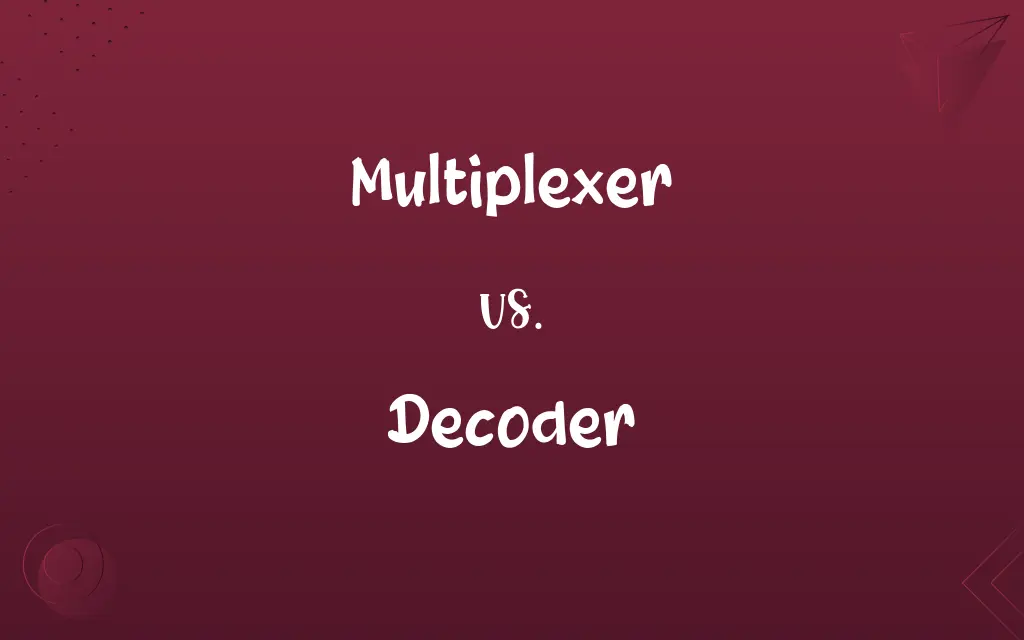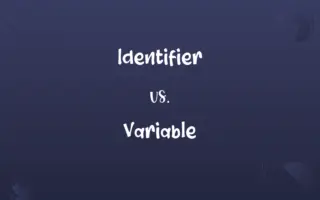Multiplexer vs. Decoder: Know the Difference

By Shumaila Saeed || Published on February 29, 2024
A Multiplexer selects one of many input signals and forwards it to a single output, while a Decoder translates encoded data back to its original format.

Key Differences
A Multiplexer, often abbreviated as MUX, is a device that selects one of several input signals and forwards the selected input to a single output line. A Decoder, on the other hand, is designed to convert encoded or compressed data back into its original form. While multiplexers deal with selecting between multiple inputs, decoders focus on the interpretation and conversion of signals.
Shumaila Saeed
Feb 29, 2024
In practical applications, a Multiplexer is commonly used in communication systems to manage multiple data lines by combining them into a single one for transmission. This is essential in saving bandwidth or line usage. Conversely, a Decoder is vital in systems where data is stored or transmitted in an encoded format, such as digital TV broadcast systems, where the decoder translates the received signals into viewable content.
Shumaila Saeed
Feb 29, 2024
The Multiplexer operates with multiple inputs but only one output. It uses selection lines to choose which input should be sent to the output. In contrast, a Decoder usually has fewer inputs but multiple outputs. It interprets the input signal and activates one or multiple outputs based on the encoded information.
Shumaila Saeed
Feb 29, 2024
From a logic perspective, a Multiplexer can be viewed as a switch that connects a selected input to the output based on control signals. Decoders, however, operate by recognizing specific input patterns or codes and generating corresponding output signals.
Shumaila Saeed
Feb 29, 2024
Multiplexers come in various types, like 2-to-1, 4-to-1, 8-to-1, etc., indicating the number of inputs they handle. Decoders, such as binary to decimal or 7-segment decoders, vary based on the type of encoded data they are designed to process. Each serves distinct roles in the realm of digital electronics.
Shumaila Saeed
Feb 29, 2024
ADVERTISEMENT
Comparison Chart
Rimary Function
Combines multiple input signals into one output signal.
Converts encoded data back to its original format.
Shumaila Saeed
Feb 29, 2024
Input-Output Relation
Multiple inputs, one output.
One or limited inputs, multiple outputs.
Shumaila Saeed
Feb 29, 2024
Use Case
Used in communication systems to save bandwidth.
Used in data recovery and signal processing.
Shumaila Saeed
Feb 29, 2024
Selection or Conversion
Selects among various inputs.
Decodes or converts the input signal.
Shumaila Saeed
Feb 29, 2024
Example Types
2-to-1, 4-to-1, 8-to-1 MUX, etc.
Binary to decimal, 7-segment decoders, etc.
Shumaila Saeed
Feb 29, 2024
ADVERTISEMENT
Multiplexer and Decoder Definitions
Multiplexer
A device that selects one of many inputs to send to a single output.
The network router uses a multiplexer to manage data from multiple computers over a single line.
Shumaila Saeed
Jan 18, 2024
Decoder
It's a device that interprets and converts encoded signals.
In a home theater system, the decoder processes digital audio signals for playback.
Shumaila Saeed
Jan 18, 2024
Multiplexer
A Multiplexer combines several input signals into one output line.
In satellite communication, a multiplexer is used to combine audio and video signals into one for transmission.
Shumaila Saeed
Jan 18, 2024
Decoder
A Decoder reconstructs data compressed for transmission or storage.
The barcode scanner at a supermarket is a decoder translating barcodes into product information.
Shumaila Saeed
Jan 18, 2024
Multiplexer
A Multiplexer efficiently routes digital or analog signals.
In digital broadcasting, a multiplexer allows multiple channels to share the same transmission medium.
Shumaila Saeed
Jan 18, 2024
ADVERTISEMENT
Decoder
A Decoder is essential for retrieving data in its usable form.
In computer networks, a decoder is used to decrypt encrypted data received over the internet.
Shumaila Saeed
Jan 18, 2024
Multiplexer
It's an electronic switch that selects one input from many.
The audio mixer in a concert uses a multiplexer to manage sounds from various instruments.
Shumaila Saeed
Jan 18, 2024
Decoder
A Decoder translates encoded data back to its original form.
The TV set-top box includes a decoder to convert digital signals into viewable channels.
Shumaila Saeed
Jan 18, 2024
Multiplexer
A Multiplexer is a data selector used in telecommunications.
Telecom networks use multiplexers to route calls through the most efficient paths.
Shumaila Saeed
Jan 18, 2024
Decoder
It converts machine-readable formats to human-readable formats.
QR code decoders in smartphones interpret the codes to reveal the embedded information.
Shumaila Saeed
Jan 18, 2024
Multiplexer
A device that interleaves several activities; a switching device.
Shumaila Saeed
Jan 16, 2024
Multiplexer
A device that combines several input signals into a single output signal.
Shumaila Saeed
Jan 16, 2024
Decoder
A device that decodes a scrambled electronic signal to make it interpretable.
Shumaila Saeed
Jan 16, 2024
Decoder
A device that decodes a scrambled electronic signal e.g. of a satellite television signal
Shumaila Saeed
Jan 16, 2024
Decoder
The kind of intellectual who converts messages from a code to plain text
Shumaila Saeed
Jan 16, 2024
Repeatedly Asked Queries
What does a Decoder do?
It converts encoded or compressed data to its original form.
Shumaila Saeed
Feb 29, 2024
How does a Multiplexer save bandwidth?
By combining several signals into one for transmission.
Shumaila Saeed
Feb 29, 2024
Where are Multiplexers commonly used?
In communication systems for combining multiple data lines.
Shumaila Saeed
Feb 29, 2024
What types of Multiplexers are there?
Types like 2-to-1, 4-to-1, based on the number of inputs.
Shumaila Saeed
Feb 29, 2024
What is an example of a Decoder's use?
Decoding digital TV signals into viewable content.
Shumaila Saeed
Feb 29, 2024
What is a Multiplexer?
A device that selects one of many input signals to output.
Shumaila Saeed
Feb 29, 2024
Do Multiplexers have a fixed number of inputs?
Yes, defined by their specific type.
Shumaila Saeed
Feb 29, 2024
Can a Decoder work with analog signals?
Yes, it can decode both digital and analog signals.
Shumaila Saeed
Feb 29, 2024
Can a Multiplexer handle digital and analog inputs?
Yes, there are MUXs for both signal types.
Shumaila Saeed
Feb 29, 2024
Is a Multiplexer the same as a switch?
Functionally similar, but a MUX is more complex.
Shumaila Saeed
Feb 29, 2024
How does a Decoder contribute to data recovery?
By reconstructing original data from encoded formats.
Shumaila Saeed
Feb 29, 2024
Is a Decoder necessary for encrypted communications?
Yes, to convert encrypted data back to readable form.
Shumaila Saeed
Feb 29, 2024
Are Multiplexers and Decoders programmable?
Some advanced models can be programmed for specific tasks.
Shumaila Saeed
Feb 29, 2024
Are Decoders used in computer networks?
Yes, for decrypting or interpreting received data.
Shumaila Saeed
Feb 29, 2024
What's a common Decoder in everyday life?
A QR code scanner in smartphones.
Shumaila Saeed
Feb 29, 2024
What's a key difference in inputs and outputs between MUX and Decoder?
MUX has many inputs and one output; Decoder has fewer inputs but multiple outputs.
Shumaila Saeed
Feb 29, 2024
How do MUX and Decoder differ in logic operations?
MUX is a selector, while Decoder interprets and converts signals.
Shumaila Saeed
Feb 29, 2024
Do Decoders need to be programmed?
Sometimes, depending on the type and application.
Shumaila Saeed
Feb 29, 2024
Can Multiplexers be used in audio equipment?
Yes, for managing multiple audio signals.
Shumaila Saeed
Feb 29, 2024
What is the significance of a Decoder in digital broadcasting?
It decodes broadcast signals for display on TV.
Shumaila Saeed
Feb 29, 2024
Share this page
Link for your blog / website
HTML
Link to share via messenger
About Author
Written by
Shumaila SaeedShumaila Saeed, an expert content creator with 6 years of experience, specializes in distilling complex topics into easily digestible comparisons, shining a light on the nuances that both inform and educate readers with clarity and accuracy.








































































